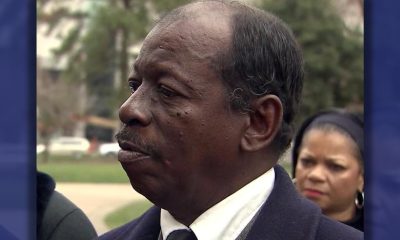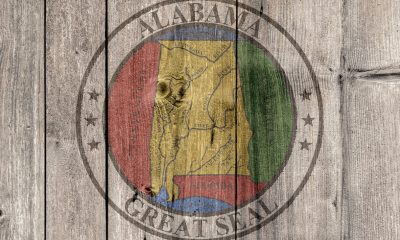National
Confederate Heritage Group Loses its US Southern Influence

Protesters hold a sign during a rally to take down the Confederate flag at the South Carolina Statehouse, Tuesday, June 23, 2015, in Columbia, S.C. For years, South Carolina lawmakers refused to revisit the Confederate flag on Statehouse grounds, saying the law that took it off the dome was a bipartisan compromise, and renewing the debate would unnecessarily expose divisive wounds. (AP Photo/Rainier Ehrhardt)
JEFFREY COLLINS, Associated Press
COLUMBIA, South Carolina (AP) — The Sons of Confederate Veterans knew an attack on their cherished symbols would come after seeing photos of the white man accused of killing nine black churchgoers displaying rebel Confederate battle flags. They just didn’t expect it from conservative Republicans.
Last week’s shootings at a historic African-American church in Charleston were so heinous that Confederate symbols suddenly became a drag on the aspirations of a Republican party hoping to regain the presidency in 2016. Shocking photographs of the suspect displaying Confederate battle flags made it easy for Republicans to break away.
South Carolina Gov. Nikki Haley spent an intense weekend consulting with party leaders before urging her state’s lawmakers to remove the rebel banner from the Statehouse grounds. Alabama Gov. Robert Bentley then acted by executive order, taking down Civil-War era flags outside the Montgomery capitol, where the pro-slavery Confederacy was born when 11 states seceded in 1861.
Leland Summers, the group’s leader in South Carolina, said he now feels betrayed by the same Republicans who courted the organization’s loyalties for decades to win the conservative white votes that relegated Democrats to a permanent minority party across the South.
“We knew it was coming,” Summers said Thursday, but these moves by conservative governors came as complete surprise.
The Sons of Confederate Veterans were founded in 1896 as a way to honor ancestors who fought for the rebel South, placing historically accurate Confederate flags on Southern soldiers’ graves and re-enacting Civil War battles.
By the 1950s and 60s, the symbols took on new meanings, as segregationist politicians hoisted flags to protest federal efforts to establish equal rights for all races. A generation later, as civil rights activists demanded that the flags come down, Summers and others insisted that these symbols are about heritage, not racism. And Republicans went along.
In an instant, the images of Dylann Storm Roof posing with rebel battle flags changed this dynamic, said Chip Lake, a Republican strategist in Georgia.
“It’s not fair to brand all persons who support flying the Confederate flag as racist. But it’s fair to say that they’ve lost the branding war on whatever statement they want to make, whether it’s ‘heritage’ or ‘history’ or something more cynical,” Lake said.
Just how much influence the Sons of Confederate Veterans and similar organizations still have may become apparent in Mississippi’s elections this year.
Several powerful Mississippi Republicans called for the Confederate symbol to be removed from the state’s flag, even though voters overwhelmingly endorsed the current design in 2001. Gov. Phil Bryant has not declared his intentions yet, but the entire legislature and all statewide officers will be pushed to take their stands.
The Sons don’t plan to surrender.
In South Carolina, the group is vowing to fight any effort to send it off to the state’s Confederate Relic Room or some other museum. In Alabama, they are already taking aim at Gov. Bentley.
But contrary forces have been massing quietly for a while across the region.
Much of the Southeast’s new population has migrated from elsewhere, and lack ties to its past. Census data shows native-born residents declined in every state of the old Confederacy from 2000 to 2010, led by South Carolina, which dropped from 64 percent to 59 percent native-born.
Auto and airline manufacturing and other new industries brought in new crops of employees and executives unwilling to stomach unfavorable publicity in an era when social media can spread bad news in an instant.
The Southern Poverty Law Center doesn’t consider the Sons of Confederate Veterans to be a hate group, unlike the Council of Conservatives Citizens. After that group was credited for inspiring the attack on a website created in Roof’s name, Republican politicians moved swiftly this week to return thousands of dollars in donations its leader had given them.
Heidi Beirich, who follows white supremacy groups for the center, said the Sons of Confederate Veterans did have a schism several years ago between members who wanted to promote white superiority and those who didn’t want to appear racist.
Membership numbers dropped thereafter, and they haven’t had a significant flag rally in years. While thousands attended a Statehouse Confederate flag rally in 2000, only 30 or so attended Thursday’s Sons of Confederate Veterans rally in the same spot.
Copyright 2015 The Associated Press. All rights reserved. This material may not be published, broadcast, rewritten or redistributed.
Arts and Culture
In ‘Affrilachia: Testimonies,’ Puts Blacks in Appalacia on the Map

By Terri Schlichenmeyer
The Bookworm Sez
An average oak tree is bigger around than two people together can reach.
That mighty tree starts out with an acorn the size of a nickel, ultimately growing to some 80 feet tall, with a canopy of a hundred feet or more across.
And like the new book, “Affrilachia” by Chris Aluka Berry (with Kelly Elaine Navies and Maia A. Surdam), its roots spread wide and wider.
Affriclachia is a term a Kentucky poet coined in the 1990s referring to the Black communities in Appalachia who are similarly referred to as Affrilachians.
In 2016, “on a foggy Sunday morning in March,” Berry visited Affrilachia for the first time by going the Mount Zion AME Zion Church in Cullowhee, North Carolina. The congregation was tiny; just a handful of people were there that day, but a pair of siblings stood out to him.
According to Berry, Ann Rogers and Mae Louise Allen lived on opposite sides of town, and neither had a driver’s license. He surmised that church was the only time the elderly sisters were together then, but their devotion to one another was clear.
As the service ended, he asked Allen if he could visit her. Was she willing to talk about her life in the Appalachians, her parents, her town?
She was, and arrangements were made, but before Barry could get back to Cullowhee, he learned that Allen had died. Saddened, he wondered how many stories are lost each day in mountain communities where African Americans have lived for more than a century.
“I couldn’t make photographs of the past,” he says, “but I could document the people and places living now.”
In doing so he also offers photographs that he collected from people he met in ‘Affrilachia,’ in North Carolina, Georgia, Kentucky, and Tennessee, at a rustic “camp” that was likely created by enslaved people, at churches, and in modest houses along highways.
The people he interviewed recalled family tales and community stories of support, hardship, and home.
Says coauthor Navies, “These images shout without making a sound.”
If it’s true what they say about a picture being worth 1,000 words, then “Affrilachia,” as packed with photos as it is, is worth a million.
With that in mind, there’s not a lot of narrative inside this book, just a few poems, a small number of very brief interviews, a handful of memories passed down, and some background stories from author Berry and his co-authors. The tales are interesting but scant.
For most readers, though, that lack of narrative isn’t going to matter much. The photographs are the reason why you’d have this book.
Here are pictures of life as it was 50 years or a century ago: group photos, pictures taken of proud moments, worn pews, and happy children. Some of the modern pictures may make you wonder why they’re included, but they set a tone and tell a tale.
This is the kind of book you’ll take off the shelf, and notice something different every time you do. “Affrilachia” doesn’t contain a lot of words, but it’s a good choice when it’s time to branch out in your reading.
“Affrilachia: Testimonies,” by Chris Aluka Berry with Kelly Elaine Navies and Maia A. Surdam
c.2024, University of Kentucky Press, $50.00.
Black History
Alice Parker: The Innovator Behind the Modern Gas Furnace
Born in Morristown, New Jersey, in 1895, Alice Parker lived during a time when women, especially African American women, faced significant social and systemic barriers. Despite these challenges, her contributions to home heating technology have had a lasting impact.

By Tamara Shiloh
Alice Parker was a trailblazing African American inventor whose innovative ideas forever changed how we heat our homes.
Born in Morristown, New Jersey, in 1895, Parker lived during a time when women, especially African American women, faced significant social and systemic barriers. Despite these challenges, her contributions to home heating technology have had a lasting impact.
Parker grew up in New Jersey, where winters could be brutally cold. Although little is documented about her personal life, her education played a crucial role in shaping her inventive spirit. She attended Howard University, a historically Black university in Washington, D.C., where she may have developed her interest in practical solutions to everyday challenges.
Before Parker’s invention, most homes were heated using wood or coal-burning stoves. These methods were labor-intensive, inefficient, and posed fire hazards. Furthermore, they failed to provide even heating throughout a home, leaving many rooms cold while others were uncomfortably warm.
Parker recognized the inefficiency of these heating methods and imagined a solution that would make homes more comfortable and energy-efficient during winter.
In 1919, she patented her design for a gas-powered central heating system, a groundbreaking invention. Her design used natural gas as a fuel source to distribute heat throughout a building, replacing the need for wood or coal. The system allowed for thermostatic control, enabling homeowners to regulate the temperature in their homes efficiently.
What made her invention particularly innovative was its use of ductwork, which channeled warm air to different parts of the house. This concept is a precursor to the modern central heating systems we use today.
While Parker’s design was never fully developed or mass-produced during her lifetime, her idea laid the groundwork for modern central heating systems. Her invention was ahead of its time and highlighted the potential of natural gas as a cleaner, more efficient alternative to traditional heating methods.
Parker’s patent is remarkable not only for its technical innovation but also because it was granted at a time when African Americans and women faced severe limitations in accessing patent protections and recognition for their work. Her success as an inventor during this period is a testament to her ingenuity and determination.
Parker’s legacy lives on in numerous awards and grants – most noticeably in the annual Alice H. Parker Women Leaders in Innovation Award. That distinction is given out by the New Jersey Chamber of Commerce to celebrate outstanding women innovators in Parker’s home state.
The details of Parker’s later years are as sketchy as the ones about her early life. The specific date of her death, along with the cause, are also largely unknown.
Activism
U.S. House Minority Leader Hakeem Jeffries Speaks on Democracy at Commonwealth Club
Based on his first speech as House minority leader, “The ABCs of Democracy” by Grand Central Publishing is an illustrated children’s book for people of all ages. Each letter contrasts what democracy is and isn’t, as in: “American Values over Autocracy”, “Benevolence over Bigotry” and “The Constitution over the Cult.”

By Linda Parker Pennington
Special to The Post
House Minority Leader Hakeem Jeffries addressed an enthusiastic overflow audience on Monday at San Francisco’s Commonwealth Club, launching his first book, “The ABCs of Democracy.”
Based on his first speech as House minority leader, “The ABCs of Democracy” by Grand Central Publishing is an illustrated children’s book for people of all ages.
Each letter contrasts what democracy is and isn’t, as in: “American Values over Autocracy”, “Benevolence over Bigotry” and “The Constitution over the Cult.”
Less than a month after the election that will return Donald Trump to the White House, Rep. Jeffries also gave a sobering assessment of what the Democrats learned.
“Our message just wasn’t connecting with the real struggles of the American people,” Jeffries said. “The party in power is the one that will always pay the price.”
On dealing with Trump, Jeffries warned, “We can’t fall into the trap of being outraged every day at what Trump does. That’s just part of his strategy. Remaining calm in the face of turmoil is a choice.”
He pointed out that the razor-thin margin that Republicans now hold in the House is the lowest since the Civil War.
Asked what the public can do, Jeffries spoke about the importance of being “appropriately engaged. Democracy is not on autopilot. It takes a citizenry to hold politicians accountable and a new generation of young people to come forward and serve in public office.”
With a Republican-led White House, Senate, House and Supreme Court, Democrats must “work to find bi-partisan common ground and push back against far-right extremism.”
He also described how he is shaping his own leadership style while his mentor, Speaker-Emeritus Nancy Pelosi, continues to represent San Francisco in Congress. “She says she is not hanging around to be like the mother-in-law in the kitchen, saying ‘my son likes his spaghetti sauce this way, not that way.’”
-

 California Black Media4 weeks ago
California Black Media4 weeks agoCalifornia to Offer $43.7 Million in Federal Grants to Combat Hate Crimes
-

 Black History4 weeks ago
Black History4 weeks agoEmeline King: A Trailblazer in the Automotive Industry
-

 California Black Media4 weeks ago
California Black Media4 weeks agoGov. Newsom Goes to Washington to Advocate for California Priorities
-

 California Black Media4 weeks ago
California Black Media4 weeks agoCalifornia Department of Aging Offers Free Resources for Family Caregivers in November
-

 Activism3 weeks ago
Activism3 weeks agoOakland Post: Week of November 27 – December 3, 2024
-

 Activism4 weeks ago
Activism4 weeks agoOCCUR Hosts “Faith Forward” Conference in Oakland
-

 Activism4 weeks ago
Activism4 weeks agoRichmond Seniors Still Having a Ball After 25 Years
-

 Activism2 weeks ago
Activism2 weeks agoButler, Lee Celebrate Passage of Bill to Honor Congresswoman Shirley Chisholm with Congressional Gold Medal





















































